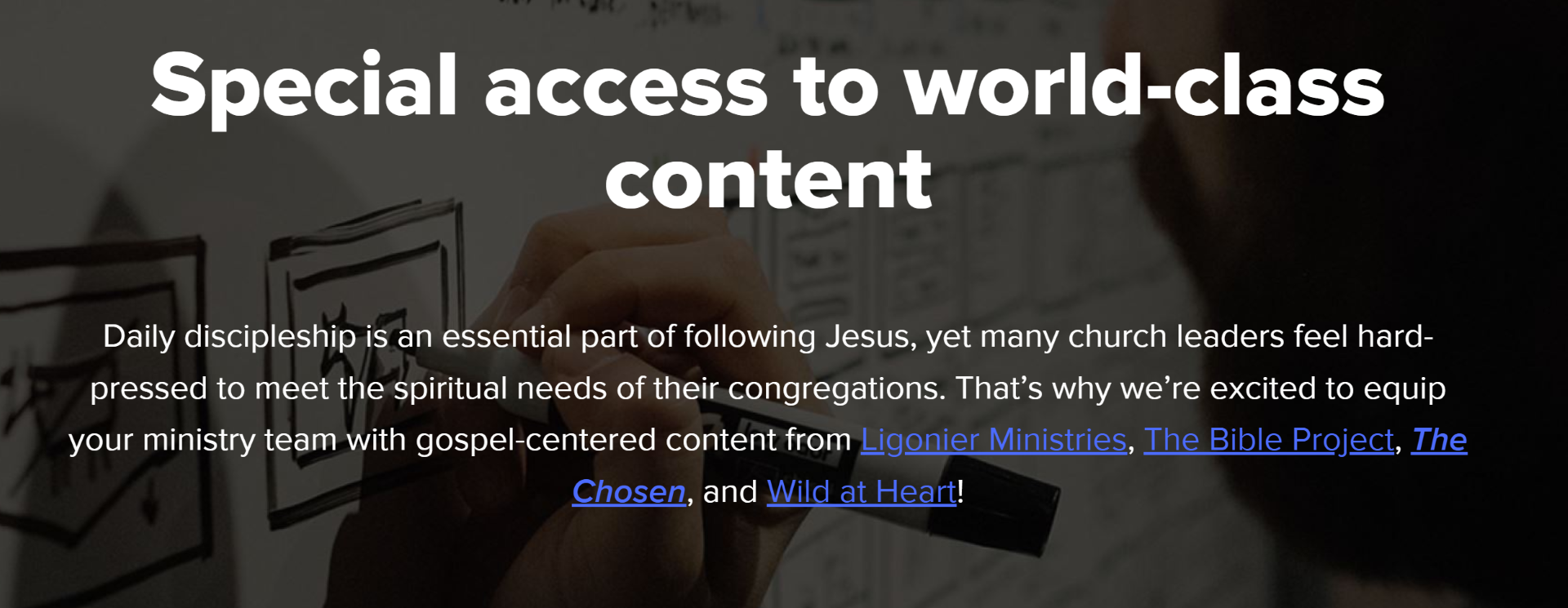The Enshitification of Church Apps
I sent the following to our team a few weeks as we're looking at deploying "church apps" to our congregation. If you're thinking about doing the same, you might find this a good jumping-off point for the discussion.
***
Hiya!
This morning I came across an extremely long essay from last January that crams a lot the current digital landscape into a very neat, easily digestible, one-stop briefing: https://www.wired.com/story/tiktok-platforms-cory-doctorow
I can't recommend this article enough. It's crass, but the author is an English GenXer who writes about technology for a living. So I'll give him some lenience.
His thesis is, "Surpluses are first directed to users; then, once they're locked in, surpluses go to suppliers; then once they're locked in, the surplus is handed to shareholders and the platform becomes a useless pile of shit. From mobile app stores to Steam, from Facebook to Twitter, this is the enshittification lifecycle."
The best example here would be Google: Google started by trying to add as much value as they could to the search experience. Then, once users were locked in, all the energy got pushed to people wanting to sell ads to those users, then once that eco system was locked in, all effort has gone into maximizing shareholder profits, which is why you can't find anything in Google anymore.
This matters to us because church practices are downstream from secular practices and, in my experience, the church always adopts patterns from her secular counterparts (we like to think we're above it all, but we're actually at the tail end of it all). I'm pretty confident Doctorow's cycle will appear in church platforms. We know that because we're already starting to see it.
Here is how Subsplash spins it on their website as of today:

To me, this kind of partnership is the strongest argument against church apps.
But to understand why, we have to see the church, not as we see ourselves, but as the corporate world sees us.
Broadly speaking, the church market is about 250,000 potential Business-to-Business (or B2B) customers for publishers and distributors. The "faith based" music industry sees their audiance at about 53 million. That's a lot when you consider that the slice of streaming belonging to "faith" is larger than Jazz and Classical combined.
On the film side, Sherwood Pictures really showed how great this demographic can be with Facing the Giants (Budget: $100k/Boxoffice: $10m), Fireproof ($300k/$30m), and Courageous ($2m/$32m). IndieWire has a good breakdown of how that has taken off recently here (For example, "Jesus Revolution" did $53m against a reported $15m budget).
But both of these are on the entertainment side. The non-fiction book and curriculum projects are much closer to what we do.
Let's explore this with a hypothetical:
Let's say you're a product owner for a publisher and we've just inked a 4-book deal with an up-coming Christian influencer. Let's call her Britany and let's say she's been a blogger/Instagrammer/TikToker who has leveraged her notoriety into the Christian conference circuit and her social numbers are indicating that we can convert a percentage of our audience into a reasonable amount of revenue.
Marketing campaigns can look like 1%-3% conversion on a list, so let's say Brittny has 500k actives across platforms (that is, people who are actually engaging with her content). So that's 5,000-15,000 potential buyers, but we really want to sell this to our VP of Publishing, so we're going to say her audience is so engaged ("I mean, Brittney is just such an immense talent and she's so in touch with her community and they just love her") that we're going to double....triple the estimate just so the numbers make sense.
There is actually no data to support this claim, but we have to convince ourselves that we can move 50,000 units. But I mean, this is Brittny we're talking about; it should be fine, right?
Anyway, let's say Brittany's first book ("Hey God?: Knowing When to Pray") was actually going to be self-published until she signed with us, so all the development, editorial and layout is finished, we just need to go to print. This is great news because it means you can drop the first book without incurring any development costs which means (1) we can start realizing revenue on the product line almost immediately and (2) we can see what the sales and list-conversation rates actually are ("In retrospect, our initial estimations may have been a too optimistic." you have to explain to the VP 6 months from now).
So, we need as much revenue and conversation as humanly possible and ASAP.
You work with your team to change the title and the cover just because (seriously, every publisher does this. The assumption is you sell the title and the cover. One author repeatedly said to me, "We don't care if they read the book; we care if they buy the book.").
The next step is to develop it into a 5-week small group curriculum. Why? Because we have options: we can sell a single book to a known audience for $20 per unit or we can package the book with a video product, and charge $40 for the package, which doubles the revenue and helps us move into second audience (small group leaders) who can then recruit other buyers into buying either the $20 or $40 thing.
Or, better, we can package the package into sets of 5 and then more than 7x our revenue up to $150 ("Save $50!"), which opens up the church market with it's 50,000,000 potential customers.
That turns our $20 direct-to-consumer product into a $150 Business-to-Business product.
And that's where the real money is. But you do have an issue: how are you going to let the 250,000 churches know they can by your $150 thing?
That's the question hanging over your entire product portfolio when a Subsplash or PCO rep walks into their room and says, "Oh hey, we've onboarded 18,000 churches who are actively working to onboard their congregations into our Media App—and they're paying us to do it!"
That's one hypothetical way you end up with publisher and app developers inking distribution deals like Subsplash and Faithlife already have.
If you're wondering if that's how it really works, here's a photo of the team that supported my first solo, development-to-drop, DVD product (it bombed, but I learned a lot).

What does all of this have to do with Doctorow's "enshitification" thesis and church apps?
If it's true that platforms naturally follow a life cycle that brings value to users, and then to businesses, and then to shareholders until there's no value left and the platforms become hot garbage and is eventually replaced, then spotting that pattern is essentially the "food handler's license" of leading and managing a community, particularly as we push them into digital communities.
Doctorow can try to create a new, boorish label for shock value, but "enshitification" is actually just marketing doing what marketing does. It's the native rot when you cultivate a community because, to a marketer, "community" is just another word for "audience"—the #1 thing they need to do their job.
The key for app and platform deployment is spotting where a platform is in its product lifecycle. That matters for a church specifically because of the high cost of vendor lock-in: Once your church is locked into an app, it is incredibly costly to move them to something new —hence why our motley crew even exists.
But once that work is done, if the vendor decides they've gained as much market share as they can and as much value from their customers as they can, then they have to start drilling for new revenue streams (or else "vertically integrate", but that's whole other conversation).
There's a lot to nosh and discuss here (my head has been swirling around much of it for the past 15+ years), but the biggest actionable thought for me is that deploying apps or platforms to a church is not primarily a technological concern. The primary concern is how we keep the congregation from being turned into a product for businesses to sell to each other.
As we're asking congregants to onboard into apps and platforms, I think we have to think about the congregation, the staff, and the larger technological and economical winds blowing across landscape.
So yeah, wise as serpents, gentle as doves, and (as one pastor said to me through tears), "Don't ever become cynical."
I'm still working on that. :-p
Anyway, tea is on me if you want to have a stupid-long conversation about a philosophy of technology. 😂
Thanks for putting up with me and Happy Thursday!
-David

Member discussion